

The Multiple Sclerosis Center of Atlanta. Lipoic Acid as a Treatment for Acute Optic Neuritis. Primary Outcome Measures: The primary outcome measure will be the difference from baseline in retinal nerve fiber layer (RNFL) thickness of the affected optic nerve, as determined by OCT, at 12 and 24weeks post LA treatment. [ Time Frame: Baseline, Week 24 ] [ Designated as safety issue: No ]Individual data will be assessed at the last study visit (six months post baseline).
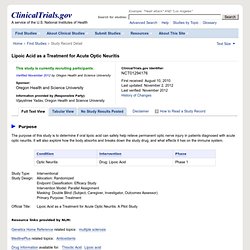
Group data cannot be assessed until all participants have exited the study. The time frame for final assessment of the primary outcome measure is dependent on how quickly the recruitment goal is met. Oral lipoic acid is an antioxidant that helps proteins work in the body. It is available in oral and intravenous formulations and has been used in the past to treat nerve damage like that seen in diabetes and some other metabolic disorders. It is available as a dietary supplement in the United States. Visual Reconstitution Therapy After Optic Neuritis. Incomplete remission after an optic neuritis attack is not uncommon.
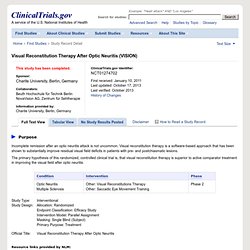
Visual reconstitution therapy is a software-based approach that has been shown to substantially improve residual visual field deficits in patients with pre- and postchiasmatic lesions. The primary hypothesis of this randomized, controlled clinical trial is, that visual reconstitution therapy is superior to active comparator treatment in improving the visual field after optic neuritis. Neuroprotection and Repair in Optic Neuritis. Cannabis for Spasticity in Multiple Sclerosis. Primary Outcome Measures: Change in an objective measurement of spasticity between the pretreatment assessment and the 3- and 7-week assessments [ Time Frame: 7 weeks ] [ Designated as safety issue: Yes ] Secondary Outcome Measures: Differences between active agent and placebo in the changes in Ashworth Scale, Functional System Score, Expanded Disability Status Score, Ambulation Index, Functional Composite Score, and Quality of Life Inventory. [ Time Frame: 7 weeks ] [ Designated as safety issue: Yes ] The treatment of MS is far from satisfactory.
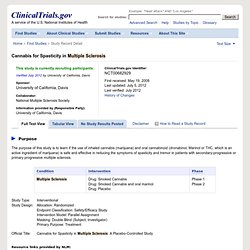
For acute attacks, high dose corticosteroids seem to reduce the duration of attacks and to reduce the likelihood of future attacks. Immunomodulatory agents, available in this disease over the last decade, reduce the frequency of severe attacks by about one third. The remainder of the treatments are symptomatic, aimed at reducing the disability already present. Biomarker Study After Initiation of Treatment With Fingolimod (FTY720) in Patients With Relapsing-remitting Multiple Sclerosis.
This study has been completed.
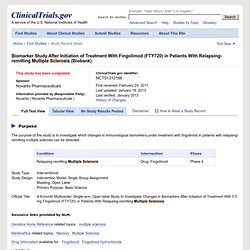
Sponsor: Information provided by (Responsible Party): Novartis ( Novartis Pharmaceuticals ) ClinicalTrials.gov Identifier: First received: February 24, 2011 Last updated: January 18, 2013. Tysabri Effects on Cognition and Neurodegeneration in Multiple Sclerosis. This study is currently recruiting participants.
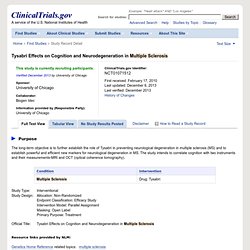
Verified December 2013 by University of Chicago. Autologous Mesenchymal Stem Cell (MSC) Transplantation in MS. This study is ongoing, but not recruiting participants.
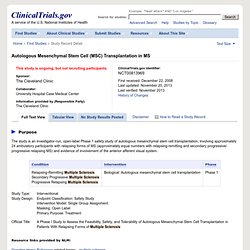
Sponsor: Collaborator: University Hospital Case Medical Center Information provided by (Responsible Party): The Cleveland Clinic ClinicalTrials.gov Identifier: First received: December 22, 2008 Last updated: November 20, 2013 Last verified: November 2013 The study is an investigator-run, open-label Phase 1 safety study of autologous mesenchymal stem cell transplantation, involving approximately 24 ambulatory participants with relapsing forms of MS (approximately equal numbers with relapsing-remitting and secondary progressive/ progressive relapsing MS) and evidence of involvement of the anterior afferent visual system. Stem Cell Therapy for Patients With Multiple Sclerosis Failing Interferon A Randomized Study. Multiple sclerosis (MS) is at onset an immune-mediated demyelinating disease.
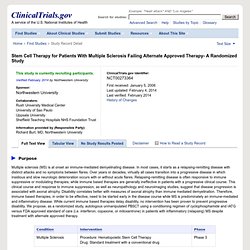
In most cases, it starts as a relapsing-remitting disease with distinct attacks and no symptoms between flares. Over years or decades, virtually all cases transition into a progressive disease in which insidious and slow neurologic deterioration occurs with or without acute flares. Relapsing-remitting disease is often responsive to immune suppressive or modulating therapies, while immune based therapies are generally ineffective in patients with a progressive clinical course. This clinical course and response to immune suppression, as well as neuropathology and neuroimaging studies, suggest that disease progression is associated with axonal atrophy. Disability correlates better with measures of axonal atrophy than immune mediated demyelination. 2.1 Primary Endpoint: 2.2 Secondary Endpoints:
Stem Cell Cosmetic Surgery. Multiple Sclerosis MS Stem Cells Treatment neurological deterioration. Multiple Sclerosis (MS) is an inflammatory, autoimmune, demyelinating disease of the central nervous system that destroys myelin, oligodendrocytes, and axons (14).
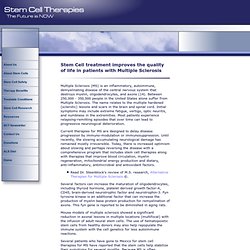
Between 250,000 - 350,000 people in the United States alone suffer from Multiple Sclerosis. The name relates to the multiple hardened (sclerotic) lesions and scars in the brain and spinal cord. Initial symptoms may include extreme fatigue, vertigo, optic neuritis, and numbness in the extremities. Most patients experience relapsing-remitting episodes that over time can lead to progressive neurological deterioration.
Current therapies for MS are designed to delay disease progression by immuno-modulation or immunosuppression. Read Dr. Several factors can increase the maturation of oligodendrocytes, including thyroid hormone, platelet derived growth factor-A, CD45, brain-derived neurotrophic factor and neurotrophin-3. This information is presented for educational purposes only. Multiple Sclerosis and Stem Cell Therapy. Or (formerly called ) describes a medical condition in which the kidneys fail to adequately filter toxins and waste products from the blood.